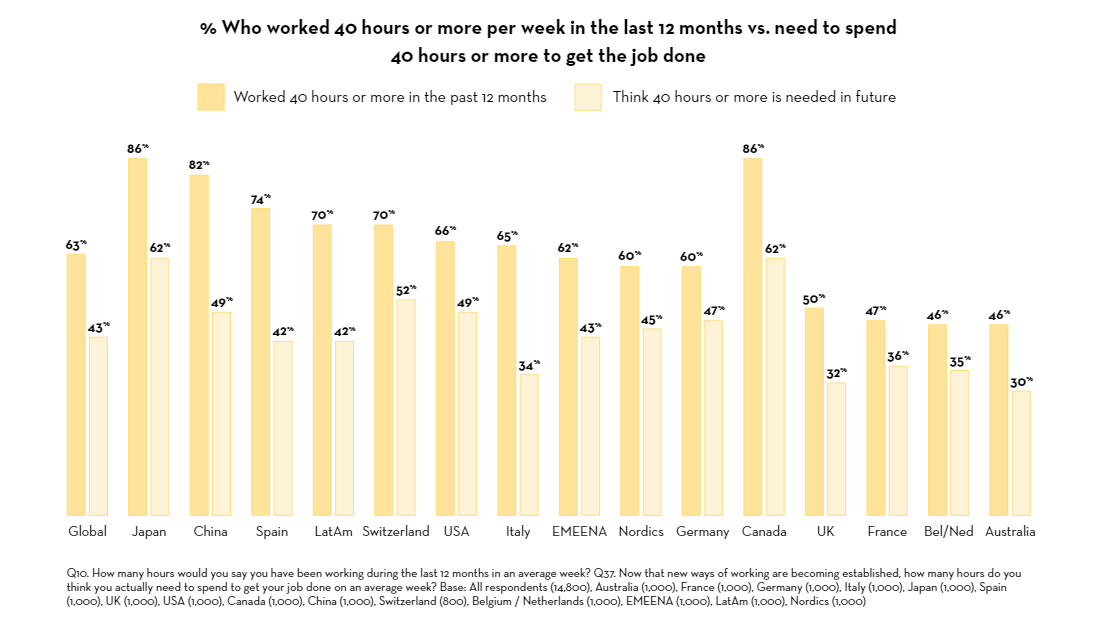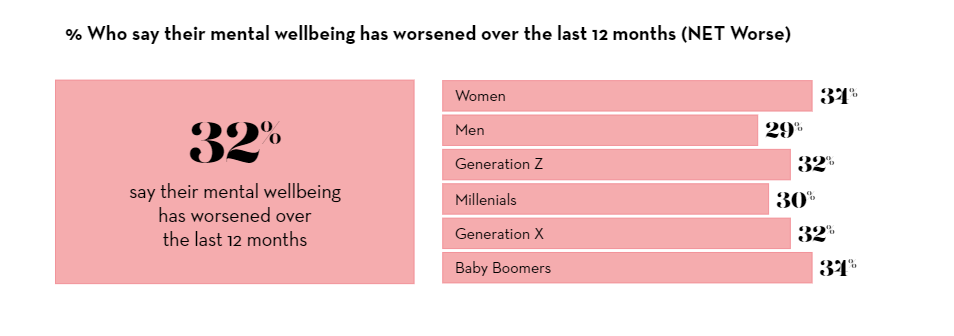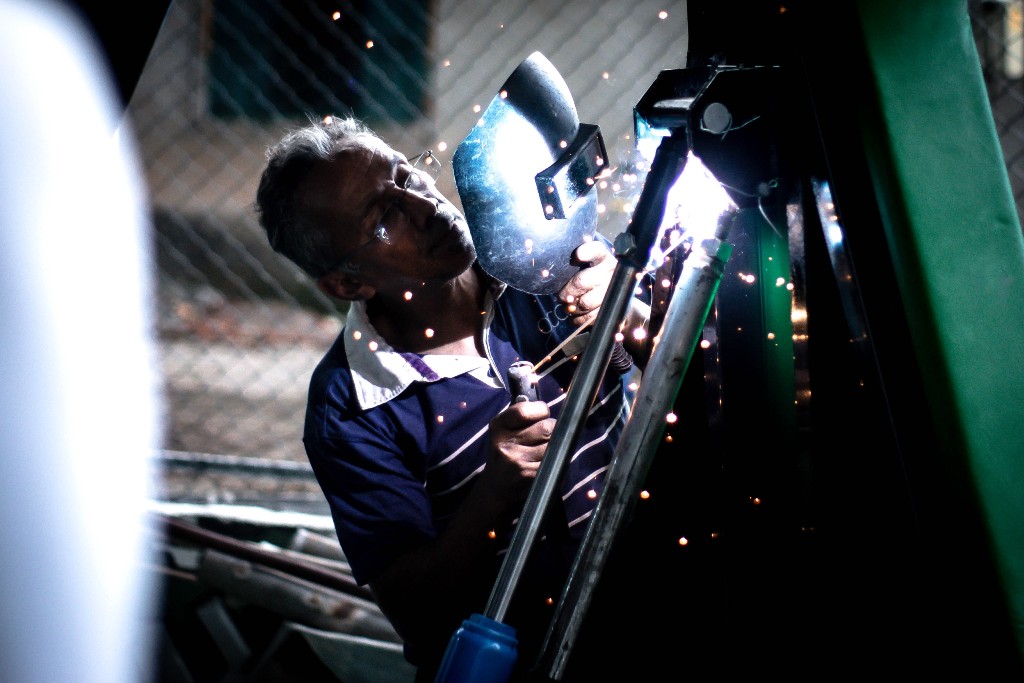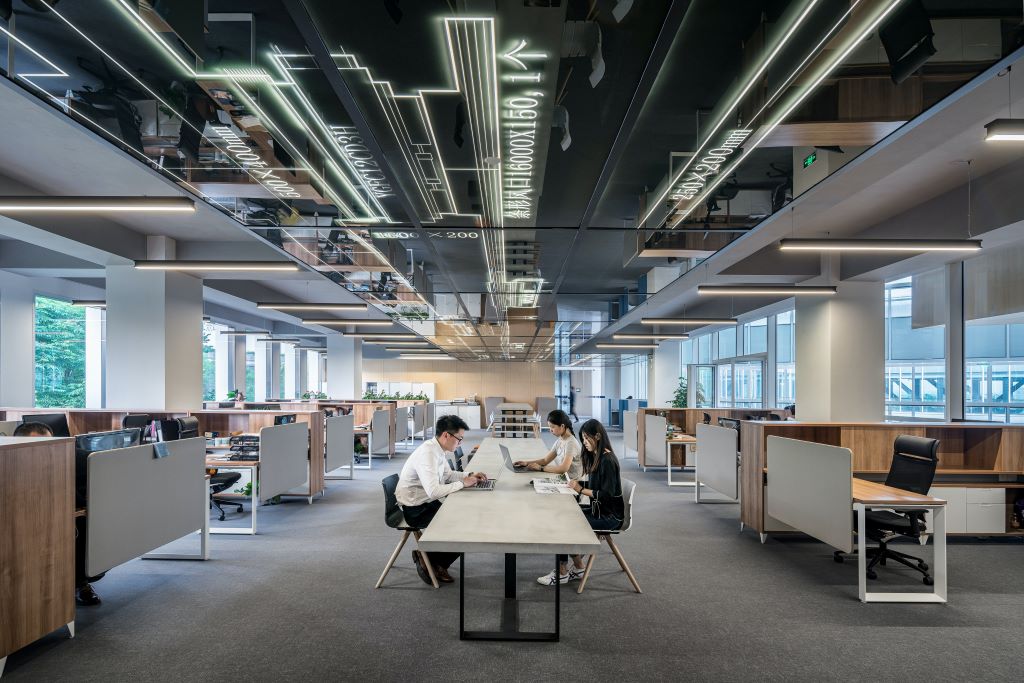Back-to-back Zoom calls. Long hours staring at screens. Answering emails before and after working hours. Not taking enough breaks.
On top of managing their work, employees are navigating through the fear, loneliness, and stress of an unprecedented global pandemic; add in family responsibilities, childcare, and subsequent lockdowns, and it’s no surprise that workers are stressed out, exhausted, and tired
So much of the workforce is burned out from working longer hours for months on end. Four in 10 people have suffered from overwork and burnout during the last 12 months.
Burnout is not a new concern, but it remains a pressing issue, our research shows. Thirty four percent of women said mental wellbeing has worsened over the past month. It’s even worse for younger leaders: 54% of young leaders report that they have experienced burnout, the same group who shoulder significant responsibility for future progress.
Around the world, countries and companies are struggling to manage the effects of employee burnout. Companies like LinkedIn and Bumble are shutting down their offices for a week to offer workers a break. Others are giving employees free days off to help ease the pressure of the past year and a half. These are only two examples of countless other trends. From free vacation days to evolving sick day policies, companies are grappling with burnout and trying to figure out how they can help their employees – before it’s too late.
To fully understand the rising and shifting expectations and attitudes of both employees and managers in this new era of work, the Adecco Group commissioned an eight-market study into attitudes, behaviours, and outlooks of office-based workers on the future of work. Resetting Normal: Defining the New Era of Work helped businesses and organizations better navigate uncertain times in 2020
The second edition of Resetting Normal, which you can download here, builds upon our original research and expands on the outlook for the future of work for 2021 and beyond surveying 14,800 knowledge-workers across 25 countries.
In our survey, we found the pandemic continues to have a significant impact on wellbeing, mental health, and burnout. Managers and employees alike are struggling more than ever with burnout across the board – so much so that it’s slated to become the next major worker pandemic.
But there’s a catch: not all leaders are aware of the impact of burnout on their workforce. Here’s what we learned about wellbeing and burnout from more than 15,000 workers across the globe – and how leaders can take action now to do things differently.
The Burnout Breakdown

Of the workers surveyed, 32% said their mental wellbeing has worsened over the past 12 months. That number is slightly higher for women, Gen Zers, Gen Xers, and Baby Boomers.

Burnout has been particularly prevalent for younger generations, with more than half of young leaders (54%) reporting feeling burnout. Significantly, this is the same generation that will shoulder substantial responsibility for the company’s future progress.
Burnout remains an issue as well when examined across different countries. Workers in Australia, EEMENA, and Italy are more likely to admit to suffering burnout.
.png?h=547&iar=0&w=1171&hash=C79C452B71FC937AED5BA20DA14CA64D)
Managers: Still Catching Up
It’s important now, more than ever, for companies to re-evaluate and reassess how they can better support employee mental health, our data shows.
In fact, our recent data found that most managers are still far behind when it comes to identifying signs of burnout in employees. More than half of all managers find it hard to identify when staff may be struggling with mental health issues (53%) or overwork and burnout (51%).
Employees agree. Almost four in 10 workers suffers from overwork or burnout – and their managers don’t always notice, they say. Sixty seven percent of non-managers say that their leaders do not meet their expectations for checking on their mental wellbeing. Urgent interventions are needed.
A hybrid working model unlocks more opportunities to advance diversity and inclusion within the workforce, but companies can’t achieve these goals without building better and more flexible working environments. One facet of this? Mental health.
Unsurprisingly, increasing the focus on wellbeing is rated as one of the top three priorities workers expect from companies going forward, right after technology and IT systems that facilitate better digital ways of working.
Companies need to focus on equipping leaders and employees with skill sets that promote and support positive mental health at all levels of the organization
It is increasingly necessary for companies to establish processes, resources, coaching and tools to foster openness and to listen to employees’ needs, and in order to help workers develop resilience. Leadership development, coaching and resources for managers on how to deal with and respond to these situations is key.
68% of managers say coaching on leadership skills will be important for them going forward but only 22% of them have done or are taking on coaching or leadership development courses.
.png?h=540&iar=0&w=955&hash=4EEB172F3BD098342BA077CE3F85A9DB)



